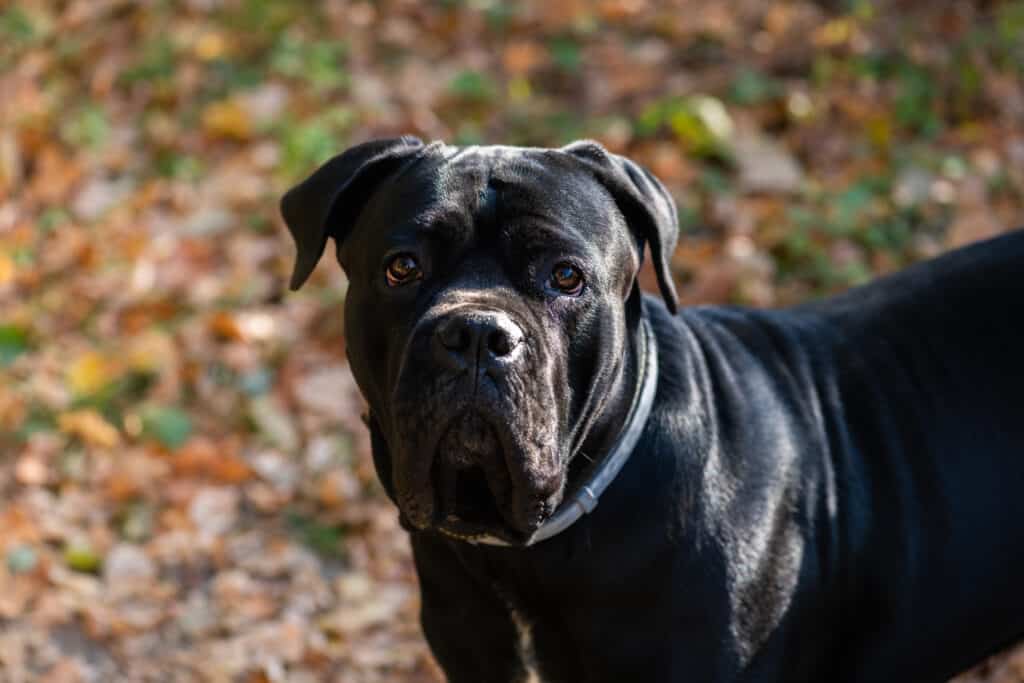Our website is supported by our users. We sometimes earn money when you click an affiliate link and make a purchase. This is at no extra cost to you and helps us to create quality content. Thank you for your support. For all that have shown us such wonderful support, we thank you from the bottom of our hearts!
The Cane Corsos are a breed of large dogs that command respect with their robust and athletic physique, tracing their origins back to Italy where they were revered as a protector and versatile working dog.
Recognized for its loyalty and protective instincts, the Cane Corso served historically as a guard dog, war dog, and a hunter of large game.
Today, members of the breed retain much of their ancestors’ bravery and dignity, serving as both noble companions and capable protectors in homes worldwide.

This breed is distinguished by the American Kennel Club (AKC) and the Cane Corso Association of America for its intelligence and ease of training, making it a popular choice for owners who are willing to invest in consistent training and socialization.
With its muscular build typical of the mastiff family, the Cane Corso exhibits a graceful confidence and a presence that is both imposing and elegant.
Key Takeaways
- Cane Corsos are versatile and powerful dogs with a rich Italian history.
- Recognized by the AKC, it excels in roles requiring intelligence, strength, and loyalty.
- Proper training, socialization, and health care are crucial for this breed’s well-being.
History of the Cane Corso
The Cane Corso, an ancient breed with a storied past, begins with origins in ancient Rome (or Greece).
Once known as a war dog, the Cane Corso’s ancestors were large, powerful canines used in combat and to guard property and livestock.
In Italy, where the breed developed further, you find the Cane Corso evolved from the Neapolitan Mastiff, tailored to be a more agile and versatile farm dog.
This Italian mastiff served various roles, such as a hunter, property guardian, and family protector.
Perhaps because of its protective character, the Cane Corso got its Latin name, which means “bodyguard dog” or “guard dog of the courtyard.”
That said breed historian Michael S. Ertaskiran, a former president of the Cane Corso Association of America (CCAA), believed that these canines came from the original Molossers, a giant-breed dog of ancient Greece’s Epirus (present-day Albania).
| Aspect | Details |
|---|---|
| Historical Role | War dog, property guardian, versatile farm dog |
| Region of Origin | Italy, specifically from the southern regions around Rome |
| Kinship | Related to the Neapolitan Mastiff, evolved for agility and versatility |
No matter where it originated from, the breed’s prowess and adaptability ensured its survival through centuries.
However, as you learn about this breed, note that its existence teetered on the brink of extinction post-World War II due to industrialization and societal changes.
Thankfully, dedicated breeders in Italy revived the breed, ensuring its lineage continued into the modern day.
The Society Amorati Cane Corso (Society of Cane Corso Lovers) was founded in 1983, and Corsos soon gained popularity at dog events around Europe by the 1990s.
The breed’s protective instinct remains one of its defining traits, a testament to its enduring legacy.
Physical Characteristics of the Cane Corso
Cane Corsos are large, muscular dogs, showcasing a majestic appearance with a large head, floppy ears and strong physique.
Recognizable for their short coat and distinctive size, these dogs carry the essence of a mastiff with their powerful build.
Height Male
Typically, a male stands about 25 to 27.5 inches tall at the withers.
Height Female
A female is slightly more diminutive, ranging from 23.5 to 26 inches in height at the withers.
Weight Male
The weight of a male generally falls between 99 and 110 pounds, highlighting their strong and giant breed characteristics.
Weight Female
A female will usually weigh slightly less, around 88 to 99 pounds, aligning with their robust but slightly smaller stature.
Eye Colors
Your dog’s eyes could be an expressive array of colors including shades ranging from dark brown to nearly black.
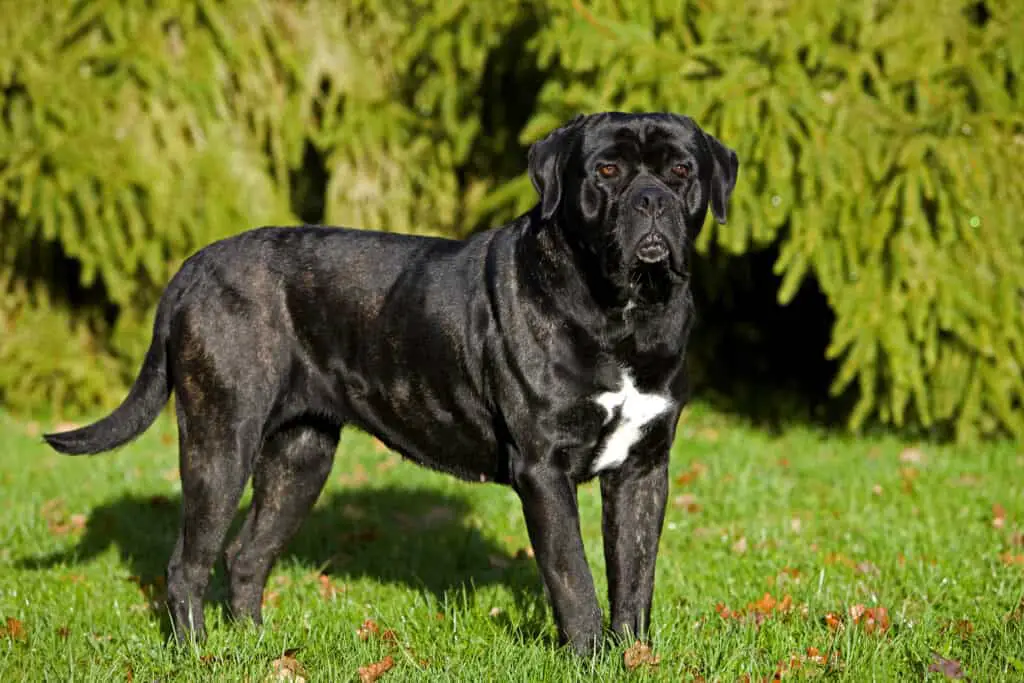
Coat Colors
With a versatile palette, theirs may be black, various shades of gray, fawn, and even red.
Brindle patterns are also common across all these colors.
Coat Types
These dogs have a short, stiff coat that accentuates their muscular frame.
It is coarse to the touch, adding to their overall hardy appearance.
Life Expectancy
On average, you can expect your dog to be a loyal companion for around 10 to 12 years.
Overview of the Cane Corso’s Physical Characteristics
When you look at Cane Corso dogs, you see a reflection of the breed’s historical background as a protector and worker.
Their size and stature contribute to their capabilities, with their muscular and sturdy body standing firmly grounded.
Their solid frame is one of balance and strength, purpose-built over centuries, from the Roman Empire to the present.
Temperament and Training of the Cane Corso
With its impressive presence and robust build, this breed is known for a temperament that balances assertiveness with affection.
This breed requires consistent training from an early age, making your role as Cane Corso owners pivotal to develop a dog with good manners.
Your dog’s energy level leans towards the active side, necessitating regular exercise and mental stimulation.
Behavior and Personality Traits
- Confident: They carry themselves with a natural confidence.
- Protective: With a strong guard dog instinct, they are naturally protective, especially towards family.
- Affectionate: Known to be loving with their family members, showing a softer side at home.
- Playfulness: Exhibits moderate playfulness, which should be encouraged.
- Intelligence: Their intelligence makes them highly trainable, but they can also be quite serious
- Training
Early Socialization: Introducing your puppy to various people, animals, and environments will help them become well-adjusted adults.
Assertiveness: Assertive, but gentle leadership is necessary to guide this strong-willed breed.
Prey Drive: Be mindful of their prey drive; early behavior training helps manage this trait.
Consistency: Ensure training methods are consistent and reinforced regularly.
While the Cane Corso is calm and collected, they display a high level of protectiveness when situations demand it.
As mentioned, they are a working breed and that role is as a bodyguard dog.
It is essential to be an owner who understands the importance of socialization—exposing your Cane Corso to different people, animals, and environments to foster a well-rounded personality.
Your Cane Corso will be a valuable and loving member of your family with proper guidance and training.
Health Issues
Cane Corsos are known for their strength and endurance, but like any breed, they are prone to certain health problems.
Being aware of these common health conditions is crucial for maintaining your dog’s health and well-being.
Hip Dysplasia
Hip dysplasia is a health concern that can impact Cane Corsos, a powerful and large-breed dog known for its strength and athleticism.
This hereditary condition involves an abnormal development of the hip joint, leading to instability and potential joint problems.
Cane Corsos have a genetic predisposition to hip dysplasia due to their size and genetics.
Symptoms may include lameness, difficulty rising, and reluctance to engage in physical activities.
While there is no cure for hip dysplasia, management strategies such as weight control, regular exercise, and joint supplements can help improve the dog’s quality of life.
Responsible breeding practices, including screening breeding dogs for hip dysplasia, play a crucial role in reducing the prevalence of this condition in the Cane Corso population.
Regular veterinary check-ups and early detection contribute to effective management and overall well-being for Cane Corsos with hip dysplasia.
Bloat
Bloat, also known as Gastric Dilatation-Volvulus (GDV) or Gastric Torsion, is a critical health concern in Cane Corsos, particularly due to their deep chests.
This condition occurs when the stomach fills with gas, causing it to twist on its axis, which can lead to a blockage of blood flow.
Cane Corsos are especially susceptible to GDV because of their anatomy.
Symptoms include restlessness, unsuccessful attempts to vomit, a distended abdomen, and signs of discomfort.
Immediate veterinary attention is crucial for diagnosis and treatment, typically involving decompression of the stomach and stabilization of the dog.
Preventive measures, such as feeding multiple small meals and avoiding strenuous exercise after eating, are essential for minimizing the risk of GDV in Cane Corsos.
Regular veterinary check-ups and awareness of the breed’s susceptibility to this condition contribute to early detection and effective intervention.
Ectropion
Ectropion, a condition where the eyelid turns outward, can affect Cane Corsos.
This can lead to the exposure of the eye’s inner surface and may result in irritation, excessive tearing, and vulnerability to infections.
While ectropion is often a hereditary trait, it can also be influenced by factors such as age, injury, or inflammation.
Cane Corsos, with their distinctive facial features, may be predisposed to this condition.
Regular veterinary check-ups are crucial for early detection and management, which may involve topical treatments or, in severe cases, surgical correction.
Responsible breeding practices that consider the breed’s anatomy play a role in minimizing the occurrence of ectropion in Cane Corsos.
Attentive care and prompt veterinary attention ensure the overall eye health and well-being of Cane Corsos affected by ectropion.
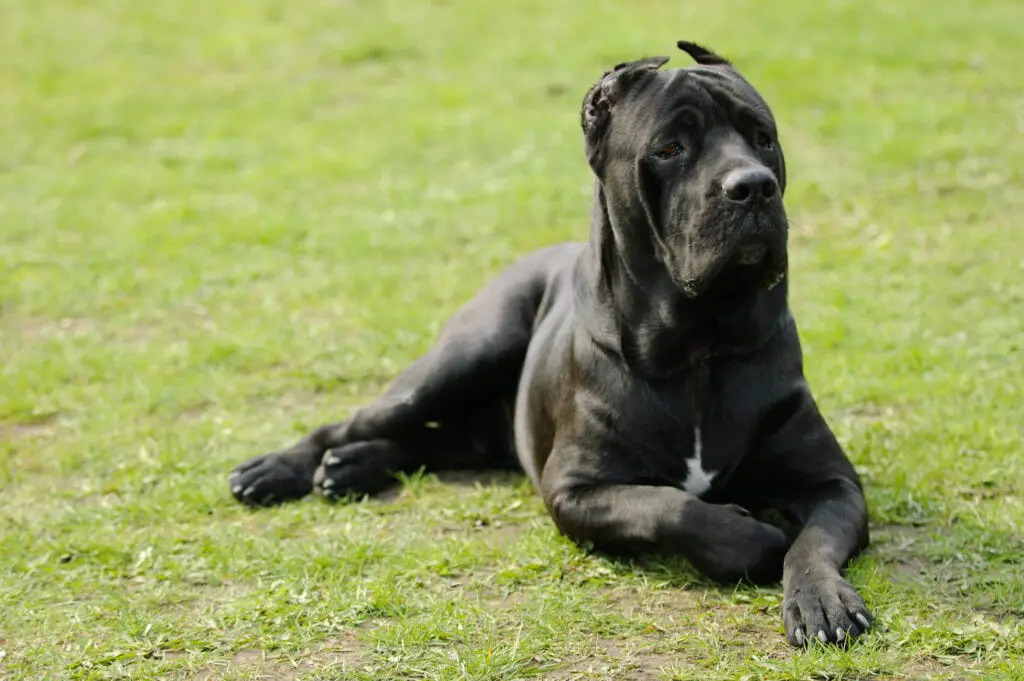
Idiopathic Epilepsy
Idiopathic epilepsy, a neurological disorder characterized by recurrent seizures without an apparent cause, can affect Cane Corsos.
This breed may be susceptible to idiopathic epilepsy, which often manifests between the ages of six months and six years.
Seizures can vary in intensity and duration, and affected dogs may experience altered behavior or loss of consciousness during episodes.
While the exact cause remains unknown, genetic factors are believed to contribute to the predisposition.
Diagnosing idiopathic epilepsy involves ruling out other potential causes for seizures through veterinary examinations and diagnostic tests.
Although there is no cure, management strategies typically involve antiepileptic medications to control and reduce the frequency of seizures.
Close collaboration with a veterinarian is essential for monitoring and adjusting the treatment plan to ensure the well-being of Cane Corsos with idiopathic epilepsy.
Demodectic Mange
Demodectic mange, caused by the Demodex mite, is a skin condition that can affect Cane Corsos.
While Demodex mites are a natural part of a dog’s skin flora, an overgrowth or compromised immune system can lead to demodectic mange.
This condition may manifest as localized, characterized by isolated hair loss and mild skin irritation, or generalized, affecting larger areas of the body.
Cane Corsos, like other breeds, may be more susceptible due to genetic factors.
Prompt veterinary attention is crucial for a proper diagnosis and treatment plan, which may involve medicated baths, topical treatments, or, in severe cases, oral medications.
Addressing underlying health issues and maintaining the dog’s overall well-being play key roles in managing demodectic mange in Cane Corsos.
Regular veterinary check-ups are essential to monitor the dog’s progress and adjust the treatment as needed.
Obesity
Obesity is a health concern that can affect Cane Corsos, and it’s essential for owners to be mindful of their dog’s weight to ensure overall well-being.
Due to their large size, Cane Corsos may be prone to weight-related issues, including joint problems and a higher risk of certain health conditions.
Maintaining a balanced diet, portion control, and regular exercise are key components of preventing obesity in this breed.
Avoiding excessive treats and providing a well-regulated feeding schedule contribute to weight management.
Obesity can lead to various health issues, such as diabetes and cardiovascular problems, so vigilance and responsible dietary practices are crucial for keeping Cane Corsos at a healthy weight and promoting a long and active life.
Regular veterinary check-ups can provide guidance on appropriate weight maintenance strategies for individual dogs.
| Common Health Issues | Description | Prevention/Treatment |
|---|---|---|
| Hip Dysplasia | Malformation of hip joint; can lead to arthritis. | Weight management, regular vet checks. |
| Bloat | Stomach fills with gas and twists. | Small frequent meals, anti-gulp bowls. |
| Ectropion | Lower eyelid droops outward, causing eye issues. | Surgical treatment if severe. |
Regular veterinary check-ups help identify these conditions early.
Proper diet and exercise can mitigate risks, and in some cases, medical or surgical treatments are available.
It is vital to monitor your Cane Corso for signs of discomfort or changes in behavior, as these can be indicators of underlying health issues.
Grooming
Proper grooming is essential for your Cane Corso’s health and wellbeing. It includes regular brushing, bathing, fur or hair trimming when necessary, nail care, maintaining dental hygiene, and keeping the ears clean.
Tailoring these practices to the breed’s characteristics will ensure your Cane Corso remains in top condition.
Brushing
Your Cane Corso’s coat requires weekly brushing to remove dead hair and minimize shedding.
Use tools like a curry brush to maintain the coat’s gleam and reduce the amount of hair left around your home, particularly during the spring shedding season.
This EquiGroomer is used by dog groomers with great results. It’s similar to a curry comb and the example video on Amazon is worth a watch.
Bathing
Bathing your Cane Corso should be done judiciously, using warm water to loosen dirt and debris.
Make sure not to over-bathe, as this can strip the coat of natural oils, which are crucial for skin and hair health.
A mild shampoo formulated for dogs is recommended for bathing.
This ELEGX massager is great for getting down to your dog’s skin with the shampoo and really giving a nice massage.
Cutting Fur or Hair
Your Cane Corso will typically have a short coat that doesn’t require regular cutting.
However, occasional trimming may be needed around the paws or beneath the tail for cleanliness.
Clipping or Grinding Nails
Keep your Cane Corso’s nails short.
Clip or grind the nails carefully to prevent splitting or cracking, which can be painful and lead to infection.
If you cut their quick, be sure to dip their nails in Styptic Powder to stop the bleeding.
If you are nervous to trim your dog’s nails, check out our article on How to Grind Your Dog’s Nails or How to Clip Your Dog’s Nails Safely.
Clipping should be done every 3-4 weeks, depending on how quickly your dog’s nails grow.
Dental Care
Good dental care is crucial.
Brush your Cane Corso’s teeth regularly to prevent tartar build-up and gum disease.
Use dog-specific toothbrushes and toothpaste for safety and efficacy.
Cleaning Ears
Inspect and clean your Cane Corso’s ears regularly to prevent infections.
You should check for any signs of redness or an unpleasant smell and clean gently with a vet-approved solution.
We like these Pet MD – Dog Ear Cleaner Wipes – Otic Cleanser for Dogs.
Owning
Owning a Cane Corso is a considerable commitment that involves understanding the cost of purchase, ongoing maintenance expenses, the adoption process, and finding reputable breeders.
This breed is renowned for its high energy level, protective instincts, and the need for a strong training regimen.
Cost of Purchase
The initial cost of purchasing a Cane Corso puppy can vary widely based on the breeder, lineage, and location within the United States.
Prices typically range from $1,500 to over $4,000 for a puppy with a good lineage from a reputable breeder.
It’s essential to consider not only the purchase price but also the long-term commitment to the dog’s care.
Maintenance Costs
When budgeting for maintenance costs, include regular expenses such as food, grooming, and health care.
A Cane Corso is a large dog with high protein requirements, which can escalate the food budget.
Medical costs for routine care like vaccinations and flea prevention should be expected, and unforeseen medical expenses can occur.
A secured fence in your yard is also necessary as Cane Corsos require space to exercise to maintain their energy levels.
Adopting a Cane Corso
Adopting a Cane Corso from a rescue group can be a rewarding alternative to purchasing a puppy.
Adoption fees are generally lower, ranging from $300 to $400, and often include initial medical care.
Adopting an adult dog can be advantageous as their temperament and exercise needs are established, but they may require additional training or socialization.
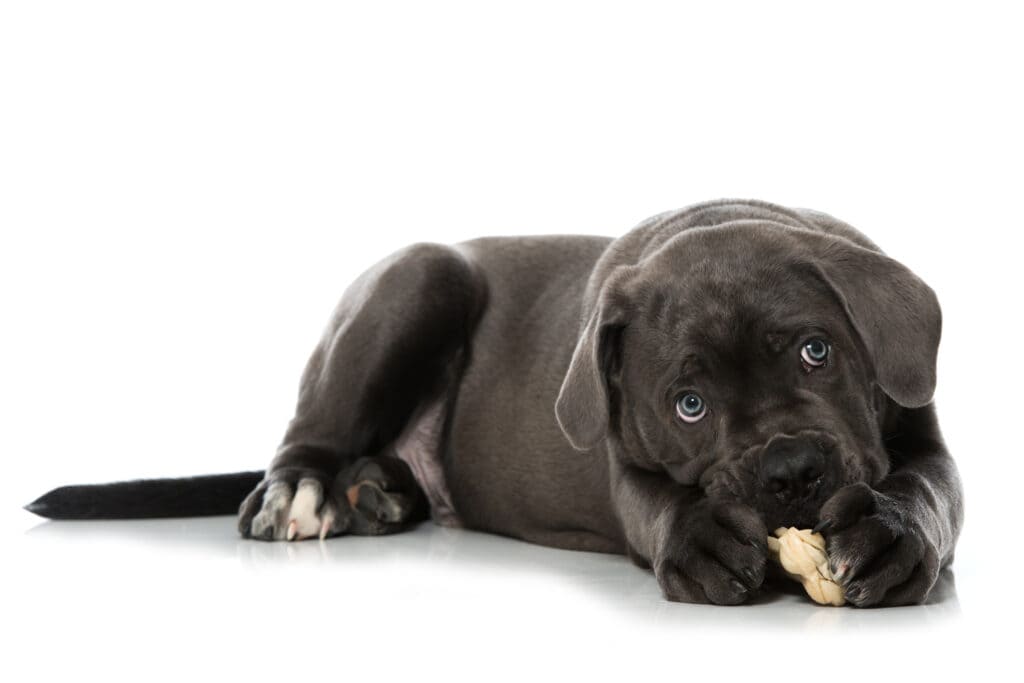
Finding Reputable Breeders
When considering bringing Cane Corso puppies into your family, it’s crucial to find responsible breeders who prioritizes health and temperament.
Look for breeders who provide comprehensive health testing results, have knowledge of the breed’s needs, and are transparent about the puppy’s conditions and parental lineage.
Establishing a relationship with a reputable breeder can also be beneficial for future support and advice regarding your new family member.
Frequently Asked Questions
When considering a Cane Corso as a pet or work companion, you likely have specific questions about their traits, size, life expectancy, behavior with children, temperament, and choosing a breeder.
What are the common traits of Cane Corso as a police dog breed?
The Cane Corso is valued in law enforcement for its intelligence, strength, and protective instincts.
Due to their trainability and assertive nature, they excel in roles that require obedience and reliability.
How does the Cane Corso compare in size and weight to other mastiffs?
While Cane Corsos are large and robust dogs, they are typically leaner and more athletic than other mastiff breeds, which allows for greater agility.
Generally, Cane Corsos are less massive than their English Mastiff counterparts.
What is the typical life expectancy of a Cane Corso?
A Cane Corso typically lives between 10 to 12 years.
Proper care, diet, and exercise are critical to ensuring a healthy life for these dogs.
How do Cane Corsos generally behave around children?
Cane Corsos can be gentle and protective around children if properly socialized from a young age.
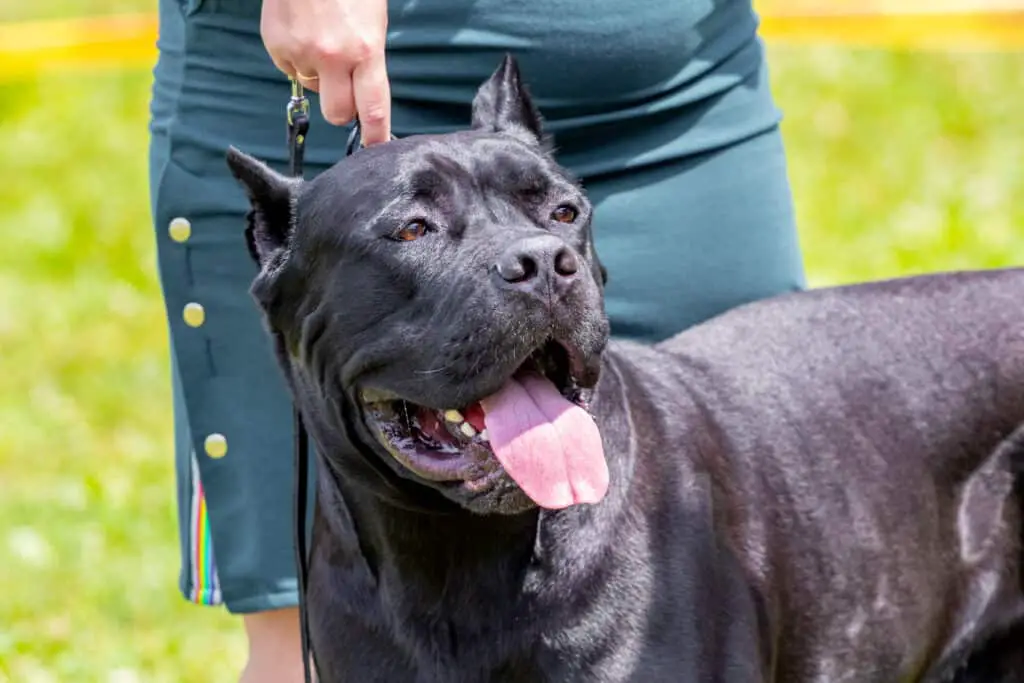
However, it’s important for their size and strength to be managed with careful training.
Can the temperament of a Cane Corso be more aggressive than that of a Pitbull?
While Cane Corsos can have a strong protective instinct, their aggression is not inherently greater than that of Pitbulls.
Socialization, training, and individual personality play significant roles in a dog’s temperament.
What are the considerations when looking for a reputable Cane Corso breeder?
You should look for breeders who prioritize temperament, health testing, and proper socialization.
A reputable breeder will provide transparent health clearances and background on the puppy’s lineage.
The Bottom Line

The Cane Corso, a mastiff-type breed, is both mighty and exceptional as a family protector and companion.
As a potential or current owner, acknowledge that the breed requires dedication when it comes to training and socialization.
They possess a strong guarding instinct that needs to be managed with consistent, positive reinforcement.
Your Cane Corso will be loyal and affectionate with your family, often forming a deep bond.
They are averagely active; a balance of exercise is crucial for their well-being.
Understand that this breed may display a stubborn streak, which underscores the importance of established leadership within the household.
| Pros | Cons |
|---|---|
| Protective and loyal to family | Can be strong-willed and stubborn |
| Versatile and intelligent | Requires regular exercise and space |
| Mild-mannered with loved ones | May drool |
Equipped with the right information and understanding, you can ensure your Cane Corso thrives in your environment.
The breed’s potential to be a well-rounded member of the family hinges on your commitment to their physical and mental stimulation, alongside your skill in cultivating their inherent traits.
With proper care and training, your Cane Corso can exemplify the best qualities of both a protector and a valued family member.
Your proactive approach towards their upbringing will result in a harmonious and mutually respectful companionship.
Please read our Legal Disclaimer

